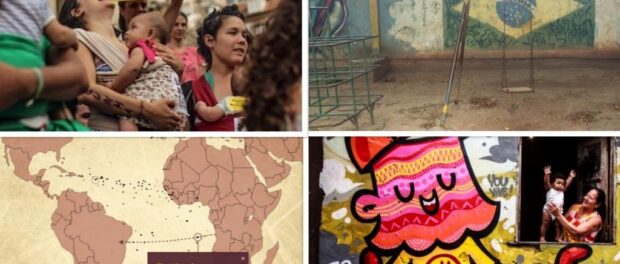
This year’s Black Awareness Month has been a critical moment for Brazil’s black community, with protests against ongoing structural racism as well as celebrations of Afro-Brazilian heritage. It has also been an exciting month for women as key issues are finally receiving deserved attention. To help our readers digest the major news and themes of the past month, we’ve summarized the stories we published here on RioOnWatch along with a few other must-reads in the media. Access all our monthly summaries here and full digests here.
November is Brazil’s Black Awareness Month, an annual occasion to celebrate the country’s Afro-Brazilian heritage and resistance to oppression. An interactive timelapse map documents the Atlantic Slave Trade from 1545 to 1860 and highlights the unparalleled scale of Brazil’s involvement. A Studio-X event this month discussed the culture of modern quilombos—originally
Activists at a Popular Committee event argued that poor, black areas of the city are disproportionately suffering from the militiarization of the city ahead of the Olympics. The New York Times published an exceptionally produced video on the heartbreaking consequences of violent struggle in Rio’s favelas, focusing on the case of ten-year-old Eduardo killed by police in Alemão in April. First investigators found police acted in ‘legitimate self-defense,’ but then the State Public Prosecutor’s Office made a potentially landmark decision to prosecute an officer.
Black women, in particular, have been at the forefront of conversation this month, in large part due to the 10,000-strong Black Women’s March in Brasília on November 18 in the context of newly published data on violence against women in Brazil. In honor of Black Awareness Month the Afro-Brazilian Museum in São Paulo celebrated author Carolina de Jesus, Brazil’s only favela writer to be published in English during the 1960s. November also saw protests against abortion restrictions and social media campaigns against harrassment, making the month an exciting moment for gender equity.
Meanwhile, pressure continues to build on Vila Autódromo next to the Olympic park, where this month the City destroyed the community’s ping pong table. Fearing that the attack on already limited public spaces is part of the City’s strategy to further intimidate them, residents and allies organized a day of collective action, as well as day-long cultural occupation, to revitalize the playground and broader community.
Other exciting community initiatives this month included two you can support directly: the Museu de Favela’s fundraising campaign to take its ‘Women Warriors’ exhibit on tour around Brazil, and the eight diverse organizations in Complexo do Alemão that have joined together to crowdfund a powerful package of services to support the community and raise visibility for their work. Several communities organized events around sustainability during Rio’s first Zero Waste Week, which took place shortly before a discussion on issues facing residents of areas near the polluted Guanabara Bay.
Finally, November also marked the 118th birthday of Providência, Rio’s oldest favela, and residents celebrated the culture of Providência as well as favela culture more broadly. The vibrancy of daily life in Rio’s favelas is the subject of stunning photos by the Imagens do Povo collective’s archivist-
Look out for our next summary of articles from December as we wrap up 2015 and reflect on the year. For more information and links to favela news from the month, see our full Favela Digest for November 2015 here. You can subscribe to receive the Favela Digest straight to your inbox each month here.
